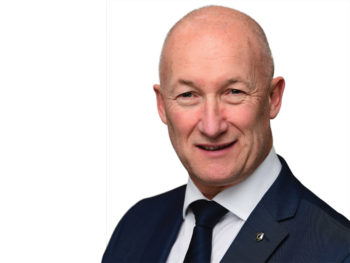With two new vans arriving this month and a strong order book, the UK van market is looking positive for Renault. Fleet director Mark Dickens talks to Dan Gilkes.

Renault’s van business is in good health, with strong sales, updated models and a leading foothold in the growing electric LCV sector. The company will introduce new Trafic and Master vans this month, to be followed by an all-new Kangoo late in 2020. After six months of sales, Renault was already at 120% of its budgeted volumes for the first half of 2019, according to fleet director Mark Dickens, and he insists that it was all good business, with far less rental volume.
Trafic remains the company’s biggest seller in the UK, taking around 10,000 sales, even in a run-out year. Master accounts for a further 4,000 registrations, with Kangoo accounting for around 2,600 van sales. Those Kangoo sales have perhaps been the most interesting though. In 2018, the electric Kangoo Z.E. made up around 10% of all Kangoo orders.
“This year, 30% of Kangoo business is Z.E.” said Dickens.
This is in part due to greater availability of the electric models from the factory, but also shows that London’s ULEZ and the many Clean Air Zones coming into force around the country are having a direct impact on electric LCV sales. That increasing demand is also pushing up residual values for used electric vans, making the Kangoo Z.E. an increasingly attractive proposition for urban users. A lot of the demand for Z.E. is from larger fleets and SMEs, indeed Renault is currently working on a quote for one large fleet for 700 electric vans.
“The growth in Z.E. is incredible,” said Dickens. “Master Z.E. has been relatively slow to start, but it has really started to ramp up now. We’ve taken a number of orders in the last weeks. But Z.E. will become the majority of Kangoo sales eventually.”
One important element of Renault’s van growth has been the expansion of its Pro+ Business Centre network. Four years ago, the company had 27 Pro+ outlets in the UK, selling both vans and cars to business users. Now it has 64 Pro+ dealers, for whom LCVs have become far more important.
“I think that we are getting to a point where it’s almost a van focus in the Business Centres,” said Dickens.
“Pro+ Business Centres are now around 70% LCV and 30% car sales. As a Pro+ dealer you have to have a level of expertise.”
That expertise extends to the conversions market, where Renault has always offered a broad range of specialist vehicles, beyond the big-selling dropside, tipper and Luton models.
“In the last two years our conversion business has dropped slightly because of our supply changes,” said Dickens.
“But in 2018 we turned that around and in 2019 we are growing volume in conversions. The off-the-shelf supply for us is pretty stable, plus we are seeing growth in ambulance and patient transport. All of our dealers have access to our corporate conversion demonstrators and we have one or two of every conversion that we do on our fleet.”
The electric LCV market is not the only sector seeing a change of model and specification mix. While traditionally fleet buyers may have looked for a fairly basic van, to keep costs to a minimum, Renault is seeing a far higher uptake of specification for its newer models, particularly related to safety.
“On major fleet for Master in particular, 80-90% of buyers are taking the full ADAS suite,” said Dickens.
The new large van now includes Blind Spot Warning, Parking Assist and Lane Departure Warning as standard, but buyers are also ticking the box for Rear View Assist among a growing range of safety and driver assistance systems.
Looking forwards, Brexit remains a concern for customers and manufacturers. However, Renault said that it is prepared to meet customer requirements whatever the outcome.
“I have written to our fleet customers about Brexit. Everything is already set-up for any eventuality, for vans our supply is secured. Whatever happens with a tariff will happen,” said Dickens.
“In major fleets we have seen no change in business demand at all. They work on a mid-term plan so orders have been fairly sustained. Small fleet is coming under pressure in the current environment though.”

